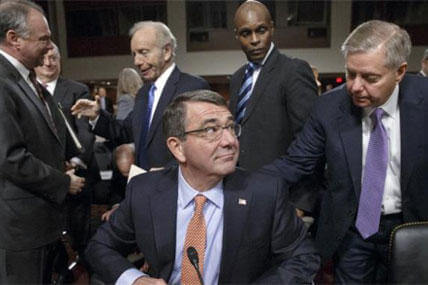Defense Secretary nominee Ashton Carter won unanimous approval Tuesday from the Senate Armed Services Committee to succeed Chuck Hagel and become the fourth civilian Pentagon chief of the Obama administration.
The SASC vote initially was 25-0, with the possibility that Sen. Dan Sullivan, R-Alaska, who was not present, might add to the vote later. Sen. John McCain, R-Ariz., the SASC chairman, said the full Senate could confirm the 60-year-old Carter as the nation's 25th Defense Secretary as early as Wednesday.
The easy path to the top Pentagon post for Carter has contrasted with the stormy confirmation process that greeted Hagel in early 2013, when he came under criticism from senators who questioned his support for Israel.
Hagel's nomination was filibustered before SASC voted 14-11 to approve him. And a divided Senate finally confirmed his nomination by a vote of 58-41, with four Republicans joining 52 Democrats and two independents to support him.
In the SASC confirmation hearing last week, Carter was mostly spared the personal attacks from Senate critics who chose to focus on what they saw as the defense policy shortcomings of the Obama administration.
McCain urged Carter to avoid "micromanagement" from the White House staff, while other Senators charged that the White House lacked clear policies on ISIS, Afghanistan, Ukraine and the Pentagon's budget.
Hagel, the first enlisted combat veteran to serve as defense secretary, abruptly announced his resignation in late November, but said he would stay on until a successor was confirmed.
Hagel never fully explained his reasons for resigning but said that he and President Obama had reached a "mutual decision" that he should step down. There was speculation that he had grown weary of dealing with a controlling White House staff.
At his own SASC confirmation hearing, Carter stressed that he would be an independent voice on issues ranging from Ukraine to nuclear policy.
Carter said last week that he was inclined to support the U.S. supplying weapons to Ukraine, a move that President Obama thus far has avoided in favor of economic sanctions on Russia.
Carter, a Yale graduate with a doctorate in physics, never served in the military but is a former deputy defense secretary, the No. 2 job as the Pentagon.
-- Richard Sisk can be reached at richard.sisk@military.com



























